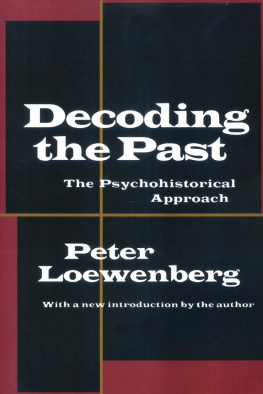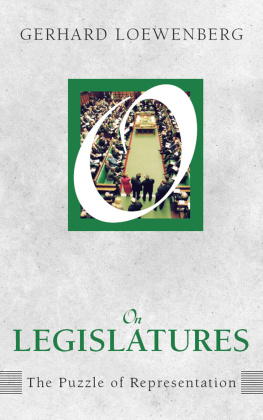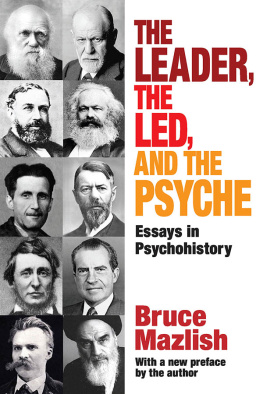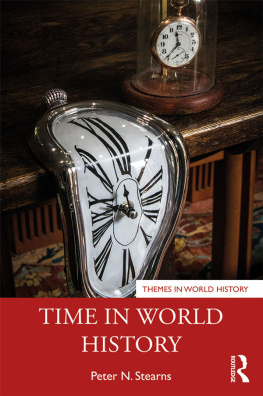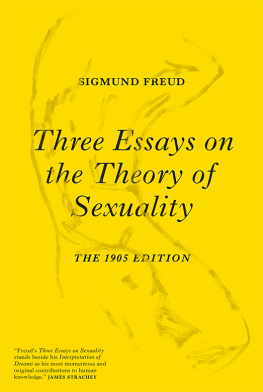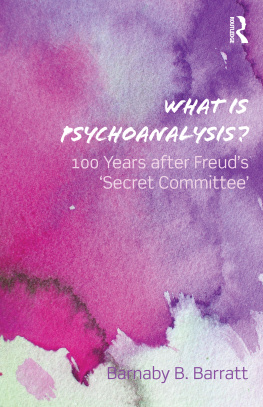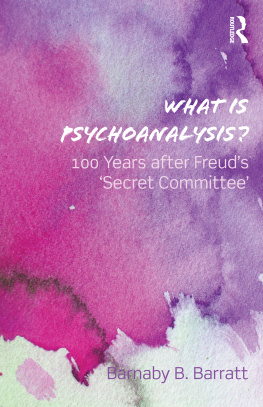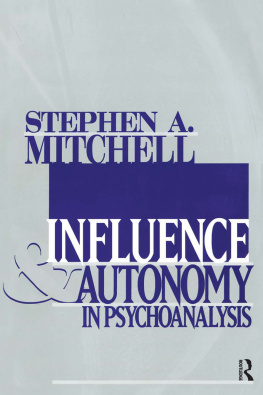First published 1996 by Transaction Publishers
Published 2017 by Routledge
2 Park Square, Milton Park, Abingdon, Oxon OX14 4RN
711 Third Avenue, New York, NY 10017, USA
Routledge is an imprint of the Taylor & Francis Group, an informa business
New material this edition copyright 1996 by Taylor & Francis
All rights reserved. No part of this book may be reprinted or reproduced or utilised in any form or by any electronic, mechanical, or other means, now known or hereafter invented, including photocopying and recording, or in any information storage or retrieval system, without permission in writing from the publishers.
Notice:
Product or corporate names may be trademarks or registered trademarks, and are used only for identification and explanation without intent to infringe.
Library of Congress Catalog Number: 95-33619
Library of Congress Cataloging-in-Publication Data
Loewenberg, Peter, 1933
Decoding the past: the psychohistorical approach / Peter Loewenberg
with a new introduction by the author.
p. cm.
Collection of essays originally published: Berkeley: University of Cali
fornia Press, 1985. With a new introd.
Includes bibliographical references and index.
ISBN 1 -56000-846-6 (pbk.)
1. Psychohistory. I. Title.
D16.16.L64 1996
901dc20
95-33619
CIP
ISBN 13: 978-1-56000-846-0 (pbk)
For Michael Black
The meaning of a life in art is to transmit the deepest feelings which men have known.
It might be described as the "decoding" method, since it treats dreams as a kind of cryptography.... The essence of the decoding procedure, however, lies in the fact that the work of interpretation is not brought to bear on the dream as a whole but on each portion of the dream's content independently, as though the dream were a geological conglomerate in which each fragment of rock required a separate assessment.
Freud, The Interpretation of Dreams
Du gleichst dem Geist, den Du begreifst. You resemble the spirit which you comprehend.
Goethe, Faust , Part I
The true history of the human race is the history of human affection. In comparison with it all other historiesincluding economic history are false.
E. M. Forster, "De Senectute"
We stand in a centenary moment at the beginning of the twenty-first century. The end of the last century saw the recognition of the role of the unconscious in human affairs and the first lethal uses of nationalism, racism and anti-Judaism in mass demagogic politics. Sigmund Freud co-authored Studies in Hysteria with Josef Breuer in 1895. His Interpretation of Dreams, completed in 1899 and published in 1900, conveyed the results of his self-analysis. That intellectual legacy, psychoanalysis, has been revised, altered, supplemented, refined, and taken into new areas in this century. I engage with the history and uses of these modern applications of psychodynamics to history and the social sciences in these essays.
Theodor Herzl published The Jewisn state in 1890 and rounded the movement of Jewish political nationalism when, in 1897, he convened the first Zionist Congress in Basel. The early Austro-Marxists, particularly Otto Bauer and Karl Renner, got it right on nationalism a century ago by insisting on its primary force and its structural importance. By contrast, the German and other social democratic parties, and to this day the classical Marxists, deprecate nationalism The Austro-Marxists proposed that the only way many peoples may live together on the same territory is to sever ethnic identity from land. Current murderous ethnic conflicts in Bosnia, southeastern Europe, the Near East, and the Caucasus are about the control of territory.
For the lands that were the battlefields of World War II this half-centenary marks the end of carnage and Nazism fifty years ago. Germanophone Central Europe only began to seriously work through the Nazi experience with the fifty-year memorial of the end of the Second World War. When I was a student in Berlin thirty-five years ago the Holocaust was the great hidden unmentionable. Today, by contrast, the Final Solution is the conscious subtext of all public discourse in Germany. Now Germans recognize the problem as a very personal and familial one. When they confront Nazism they know that they are speaking of their fathers, mothers, and siblings, their uncles and aunts, cousins and nephews, and parts of themselves.
The process of becoming a pschohistorian and using the perspectives of psychodynamics in history is an integral part of engagement with the field. The essays on the education of a psychohistorian which introduce the book are often cited and assigned. They offer three perspectives of observation: (1) the student viewing faculty and other students; (2) the faculty member relating to students; and (3) faculty responses to rivalry and envy of each other. A teacher is the target of the unconscious love, affection, admiration, as well as the hostility, competitiveness, and envy of her students. Psychoanalysts observe in the intimacy of the clinical transference the powerful tides of emotions that are acted out in institutional settings. The structural problems and psychodynamics of faculty and students are not different today than they were when Freud dealt with his teachers Brucke and Meynert over a century ago or sixty years ago when William Langer occupied a Harvard chair named after his teacher, Archibald Cary Coolidge. The emotional problems of graduate educationthe regressive pull of being treated as a dependent appendage of faculty who have the power to decide whether the student is in or outis as pervasive as it was when I wrote my piece as an assistant professor over a quarter of a century ago.
The pieces on the intrapsychic dynamics of education were written using gender-specific male language, not only because of contemporary usage, but because they were written by a man. The psychological transferences of women to other women in authoritymother, grandmother, or rivalrous/sponsoring older sister are in each case idiosyncratic. The contours of women's transferential emotional conflicts: helpless/omnipotent, altruistic/narcissistic, helpful/controlling, benign/destructive, are not different from those of men. But the interpersonal relationship problems and fantasies of feminist faculty and students are different because the feminist subculture has raised expectations of a nicer, smoother, more accommodating and conciliating way of relating to sisters. As Margaret Talbot recently noted in an article on the transferential problems with students of feminist critic Jane Gallop:

